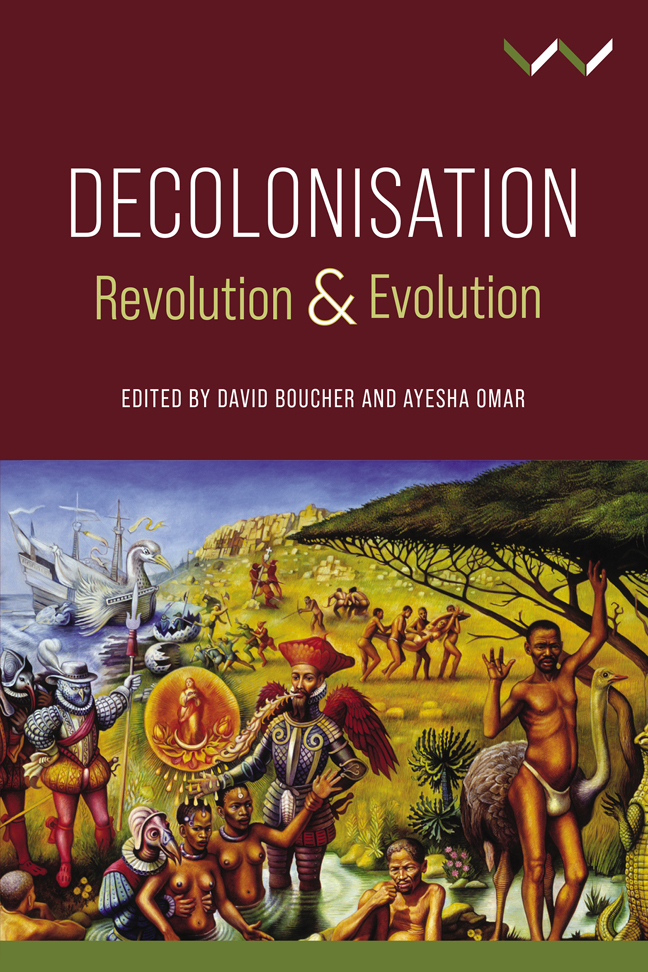Book contents
- Frontmatter
- Contents
- Acronyms
- Introduction: Decolonisation: Interdisciplinary Perspectives
- Chapter 1 The Invention of Blacks: Notes on Conquest, Fear and Time
- Chapter 2 The Decolonisation of Southern Africa: Historical Reflections
- Chapter 3 The Border of Trust at Kat River for Coloured Settlers, 1851–1853
- Chapter 4 Decolonisation and the Enduring Legacy of Colonial Borders in Africa
- Chapter 5 Fanon's Challenge: Identity, Recognition and Ideology
- Chapter 6 Beyond Redemption: Unsettling Progressive-Romantic Storyings of Colonial Injustice in Western Critical Thought
- Chapter 7 The Limits of Decolonisation and the Problem of Legitimacy
- Chapter 8 Decolonisation – Real and Imagined
- Chapter 9 Decolonisation and the Crisis of African Literature in the Twenty-First Century
- Chapter 10 Pedagogical Disobedience in an Era of Unfinished Decolonisation
- Contributors
- Index
Chapter 8 - Decolonisation – Real and Imagined
Published online by Cambridge University Press: 01 March 2024
- Frontmatter
- Contents
- Acronyms
- Introduction: Decolonisation: Interdisciplinary Perspectives
- Chapter 1 The Invention of Blacks: Notes on Conquest, Fear and Time
- Chapter 2 The Decolonisation of Southern Africa: Historical Reflections
- Chapter 3 The Border of Trust at Kat River for Coloured Settlers, 1851–1853
- Chapter 4 Decolonisation and the Enduring Legacy of Colonial Borders in Africa
- Chapter 5 Fanon's Challenge: Identity, Recognition and Ideology
- Chapter 6 Beyond Redemption: Unsettling Progressive-Romantic Storyings of Colonial Injustice in Western Critical Thought
- Chapter 7 The Limits of Decolonisation and the Problem of Legitimacy
- Chapter 8 Decolonisation – Real and Imagined
- Chapter 9 Decolonisation and the Crisis of African Literature in the Twenty-First Century
- Chapter 10 Pedagogical Disobedience in an Era of Unfinished Decolonisation
- Contributors
- Index
Summary
… the popular modern antonyms are not always the true opposites … in every situation of organized oppression the true antonyms are always the exclusive part versus the inclusive whole … not the oppressor versus the oppressed but both of them versus the rationality which turns them into co-victims.
— Ashis Nandy, Exiled at HomeSince the ‘Rhodes Must Fall’ protests which began at the University of Cape Town in March 2015, the decolonisation of knowledge and its dissemination have become central concerns – at least in theory – of South African universities. This has obvious implications beyond the academy, since it is hardly the only South African institution in which the values and assumptions of Europe have been normative in the three decades since the achievement of majority rule. Political commentator Aubrey Matshiqi observes that, in South Africa's democracy, the political majority remain a cultural minority (Matshiqi 2011). The demand for ‘decolonisation’ is, therefore, not restricted to universities – it speaks to all intellectual and cultural life.
The defeat of apartheid removed the legal impediments to citizenship for all, but left many of the hierarchies of the past in place: in effect, the cultural and intellectual underpinnings of Afrikaner Nationalism were discredited, only for those that had sustained an earlier British colonialism to take over (Friedman 2015). Given this, perhaps the only surprise about heightened demands for the decolonisation of thinking, writing and teaching is that they took so long to appear. There is clearly an urgent need for the intellectual equivalent of the negotiation process that produced the political settlement of 1994 – an exchange on how the society's thinkers, writers and teachers should begin to free themselves of colonial assumptions and to think about the society and its challenges in ways that do not reflect the view of the coloniser. That this discussion is overdue is underlined by the fact that a paper arguing for a broad negotiation on the nature of the university was written 30 years ago (Badat et al. 1993).
But, while calls for decolonisation have been very loud, they have not been very distinct: clear articulations of a decolonised intellectual framework have been largely drowned out by rhetorical flourishes. Equally important is that a frequent feature of the rhetoric is its essentialism.
- Type
- Chapter
- Information
- DecolonisationRevolution and Evolution, pp. 189 - 210Publisher: Wits University PressPrint publication year: 2023



